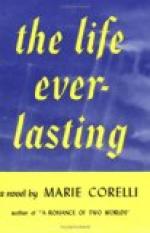still the controlling magnate of many large financial
interests in the States. He was, however, much
more English than American, for he had been educated
at Oxford, and as a young man had been always associated
with English society and English ways. He had
married an English wife, who died when their first
child, his daughter, was born, and he was wont to
set down all Miss Catherine’s mopish languors
to a delicacy inherited from her mother, and to lack
of a mother’s care in childhood. In my
opinion Catherine was robust enough, but it was evident
that from a very early age she had been given her
own way to the fullest extent, and had been so accustomed
to have every little ailment exaggerated and made the
most of that she had grown to believe health of body
and mind as well-nigh impossible to the human being.
Dr. Brayle, I soon perceived, lent himself to this
attitude, and I did not like the covert gleam of his
mahogany-coloured eyes as he glanced rapidly from father
to daughter in the pauses of conversation, watching
them as narrowly as a cat might watch a couple of
unwary mice. The secretary, Mr. Swinton, was
a pale, precise-looking young man with a somewhat servile
demeanour, under which he concealed an inordinately
good opinion of himself. His ideas were centred
in and bounded by the art of stenography,—he
was an adept in shorthand and typewriting, could jot
down, I forget how many crowds of jostling words a
minute, and never made a mistake. He was a clock-work
model of punctuality and dispatch, of respectfulness
and obedience,—but he was no more than a
machine,— he could not be moved to a spontaneous
utterance or a spontaneous smile, unless both smile
and utterance were the result of some pleasantness
affecting himself. Neither Dr. Brayle nor Mr.
Swinton were men whom one could positively like or
dislike,—they simply had the power of creating
an atmosphere in which my spirit found itself swimming
like a gold-fish in a bowl, wondering how it got in
and how it could get out.
As I sat rather silently at table I felt, rather than
saw, Dr. Brayle regarding me with a kind of perplexed
curiosity. I was as fully aware of his sensations
as of my own,—I knew that my presence irritated
him, though he was not clever enough to explain even
to himself the cause of his irritation. So far
as Mr. Swinton was concerned, he was comfortably wrapped
up in a pachydermatous hide of self-appreciation,
so that he thought nothing about me one way or the
other except as a guest of his patrons, and one therefore
to whom he was bound to be civil. But with Dr.
Brayle it was otherwise. I was a puzzle to him,
and—after a brief study of me—an
annoyance. He forced himself into conversation
with me, however, and we interchanged a few remarks
on the weather and on the various beauties of the
coast along which we had been sailing all day.
“I see that you care very much for fine scenery,”
he said—“Few women do.”
“Really?” And I smiled. “Is
admiration of the beautiful a special privilege of
men only?”




